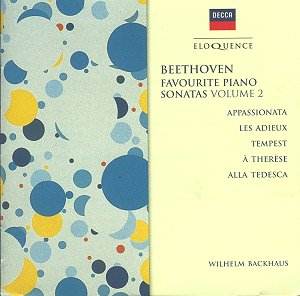Backhaus recorded the "32" twice. His mono
set was superseded but not necessarily surpassed by the stereo remakes
from which come these five sonatas – with the exception of the Appassionata
which was common to both sets as Backhaus died before he could re-record
it. The given date of 1959 in this Eloquence Decca release must relate
to the reprocessed-in-stereo version of that year.
It was fashionable for many years to judge Backhaus
in the scale and find him wanting. His prodigious early recordings were
just too fluent, his Beethovenian credentials too coarse and his rhythmic
licence too extreme. Beside the venerated Schnabel he seemed unintellectual,
next to Kempff unpoetic; even comparison to an earlier generation of
leading Beethovenians seemed to work against him – he had, for example,
little of Lamond’s artful insight. But the five sonatas here enshrined
go some way to confirming that Backhaus’s gruff plainness was as distinguishing
a feature of his playing as the supposedly more elevated characteristics
of Schnabel were a defining part of his.
In the Tempest he is more unvarnished than elemental;
there is a directness to his phrasing that is distinctly attractive
but also times in the slow movement when a rather inexpressive and slightly
monotonous feeling can descend. One can also feel a slight metrical
lethargy to his playing here though it is maybe as well to consider
it as of a piece with his conception of the sonata as a whole. Certainly
he is quite unlike the more flamboyant and skittish Schnabel in the
finale – instead he is solid, patrician with some notably fine playing.
The Appassionata reveals his deep seriousness of purpose and
the fixity of his conception. There are times when his rubato does seem
excessive but never arbitrary. He observes the con moto marking
of the andante – with, again, some superficially unevenly applied
rubato. But there is also some excellent – ‘exquisite’ is not really
a word one can ascribe to Backhaus – left hand staccato. If the movement
emerges as a little "straight" it is still powerfully alive.
He attacks the Appassionata’s finale with rough accents, occasionally
some overused pedal, but he brings out individual lines with accelerandos
and big powerful chording. Altogether this is a systematically rugged
and visceral performance.
In the two little Opp 78 and 79 sonatas we can again
appreciate the chordal depth he can sink (especially in the opening
movement of A Therese) – if a little unrelieved in its insistence.
And also the straight-faced humour of the Presto alla tedesca of
Sonata No 25 with its affecting and charmingly understated slow movement
and the sheer rightness and aplomb of the vivace. In Les Adieux,
the sonata of gentle regret, he is equally successful at conveying
pensiveness and energy, wistfulness and release.
Backhaus’s are not the most subtle and hair-triggered
of responses; he is not a dazzling colourist or a transcendental technician.
But there is great nobility and pianistic honesty in his playing and
these are qualities that belong only to the rarest of musicians.
Jonathan Woolf
AVAILABILITY
www.buywell.com


